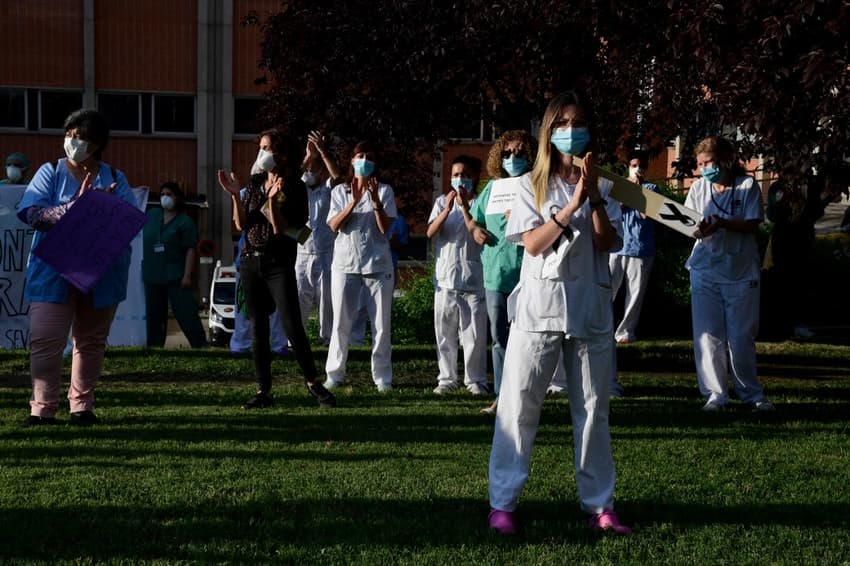Spain revises its coronavirus death toll by nearly 2,000 cases

Spain's government on Monday revised downward the country's death toll from the coronavirus by nearly 2,000, bringing the total number of deaths recorded to 26,834.
A new system of gathering data had allowed them to identify cases that were counted twice and exclude deaths wrongly attributed to the virus, said Fernando Simón, the health ministry's emergencies coordinator.
"A variation of 1,900, that's a lot," he added. "We are trying to check that it's correct, but these are the figures that we have at the moment."
The health ministry, which gathers data from regional health authorities, also revised downwards the number of confirmed cases of coronavirus, from the 235,772 announced on Sunday to 235,400.
Datos sobre #COVID19 en España, desde el primer caso inicial, actualizados a hoy 25 de mayo:
▶Confirmados por PCR: 235.400
▶Fallecidos: 26.834
Información por CC.AA.:https://t.co/gvUA5yArTc
Más info⤵https://t.co/GH8nqIFQ4l#EsteVirusLoParamosUnidos pic.twitter.com/wPBnVB2WmU
— Salud Pública (@SaludPublicaEs) May 25, 2020
"We are satisfied with the growing quality of the information that allows us to take decisions," said Simón.
"It is something that happens in every epidemic, when the evolution of the epidemic leaves us with a bit more time, you have to correct the figures and in certain cases you have to reduce them," he explained.
While the new system cut the number of deaths by 1,918, Spain remains one of the countries worst hit by the virus.
The announcement came as Spain proceeded Monday with its gradual loosening of lockdown restrictions.
Madrid and Barcelona cautiously emerged from one of the world's strictest lockdowns with parks and cafe terraces open for the first time in more than two months -- two weeks behind the rest of Spain.
With the summer heat picking up, beaches along Spain's northern coastline as well as some areas in the south, including the Canary Islands and the Balearics, are now open for swimming.
Comments
See Also
A new system of gathering data had allowed them to identify cases that were counted twice and exclude deaths wrongly attributed to the virus, said Fernando Simón, the health ministry's emergencies coordinator.
"A variation of 1,900, that's a lot," he added. "We are trying to check that it's correct, but these are the figures that we have at the moment."
The health ministry, which gathers data from regional health authorities, also revised downwards the number of confirmed cases of coronavirus, from the 235,772 announced on Sunday to 235,400.
Datos sobre #COVID19 en España, desde el primer caso inicial, actualizados a hoy 25 de mayo:
— Salud Pública (@SaludPublicaEs) May 25, 2020
▶Confirmados por PCR: 235.400
▶Fallecidos: 26.834
Información por CC.AA.:https://t.co/gvUA5yArTc
Más info⤵https://t.co/GH8nqIFQ4l#EsteVirusLoParamosUnidos pic.twitter.com/wPBnVB2WmU
"We are satisfied with the growing quality of the information that allows us to take decisions," said Simón.
"It is something that happens in every epidemic, when the evolution of the epidemic leaves us with a bit more time, you have to correct the figures and in certain cases you have to reduce them," he explained.
While the new system cut the number of deaths by 1,918, Spain remains one of the countries worst hit by the virus.
The announcement came as Spain proceeded Monday with its gradual loosening of lockdown restrictions.
Madrid and Barcelona cautiously emerged from one of the world's strictest lockdowns with parks and cafe terraces open for the first time in more than two months -- two weeks behind the rest of Spain.
With the summer heat picking up, beaches along Spain's northern coastline as well as some areas in the south, including the Canary Islands and the Balearics, are now open for swimming.
Join the conversation in our comments section below. Share your own views and experience and if you have a question or suggestion for our journalists then email us at [email protected].
Please keep comments civil, constructive and on topic – and make sure to read our terms of use before getting involved.
Please log in here to leave a comment.